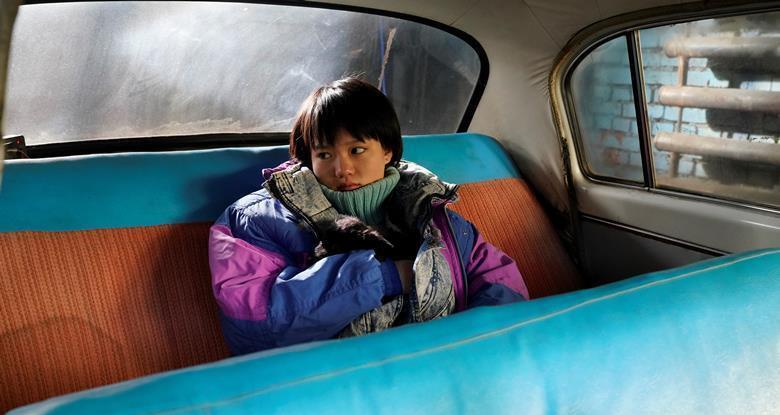LEAFF 2021 celebrates its sixth year with a programme of thirty films from celebrated and debut filmmakers. Championing East Asian cinema, LEAFF aims to bring a wide range of cinema to London and offer the opportunity to experience a new culture of cinema.
Sungleen Moon reviews the struggle of a former smuggler out of jail trying to adapt again in society and regain his prime.
Perhaps it was the cool, early-winter temperature, or how the frosty landscapes featured on the screen illuminated the entire cinema, but watching Dalei Zhang’s Stars Await Us (2020) made me feel cold, solitary, and left me stuck with a decision to either remain in the frigid comfort of my seat or to grab another layer and choose warmth.
The dilemma of a choice between two binaries is translated throughout the film also. From the closed-off, internal world of a prison, to the harsh, external reality of winter, Mi Bao (Liang Jingdong), leaves his past life to assimilate in a new town that lies on the border between Russia and China, a place also stuck between two languages and cultures. This attempt at beginning a new life while the older continues to haunt Mi Bao, heightening his feelings of isolation and inability to connect with his newfound community. We soon discover that Mi Bao is stuck from progressing in his new life due to the concerns of his previous one, and ultimately, his identity is questioned. Swarming with passion, violence, and love, recurring flashbacks portray a strikingly different Mi Bao to the character who was introduced at the beginning of the film. In the opening scenes, Mi Bao lifelessly walks under the frosty sky. He is lacking passion, motivation, and wanders on to a group of people singing a folkloric song together. He is alone. This contrasts with the character we see in a few fleeting scenes: a man of rage, connected to gangs and murder. His anchored connection to his mysterious past life becomes stronger as Mi Bao desperately attempts to find a woman named Karinna. The ex-girlfriend becomes the driving force for him and the film’s narrative, as he attempts to locate and reunite with her. Stars Await Us explores the difficulty of progression, reminding us of how our unfinished businesses, past desires, comforts, and nostalgic dreams haunt and prevent our development of ourselves today.

From traditional anthems to party setlists, music is a recurring motif. In the first half of the film, music is used to amplify Mi Bao’s loneliness and isolation. His efforts to reconnect with the community and bring back normalcy in his life by attending bars, concerts, parties that so easily unify everyone, ends up isolating Mi Bao even further. Flashbacks to Mi Bao and Karinna under the disco lights and backdrop of party music recurringly emerge, showing that Mi Bao reminisces in his time with Karinna and cannot enjoy the melody without her. During the second half of the film, after his successful building of friendships with the policeman neighbour who dresses up as a clown, Su (Zakharov Evgenij Sergeevich), and a young couple, Wei (Zhang Ninghao) and Xixi (Huang Lili), he becomes more comfortable with participating in musical events. Music leads Mi Bao to integrate with the community and also guides him to develop a relationship with a mysterious woman (Hai Qing), who also desires to fulfil her past dreams of becoming a dancer. Their relationship, devoid of much interaction, was intimately rendered and was one of the most intriguing elements of the plot. Although we do not know much about these characters as the plot becomes more and more elusive, the characters feel very real and can be easily empathised with for their continuous desperation for happiness, a solid identity, and a search for a better life as their past weighs on them.
Even with the sudden genre switch near the final act of the film, where events take a thrilling turn, the whole film has a strong sense of calm throughout. With its mellow cinematography and colour-grading, long and slow takes of people in contemplation, and a reflective score, Zhang’s film is quietly subtle and beautifully meditative. It reminds us of other examples of East Asian filmmaking that rely on the everyday culture of our lives, such as Edward Yang or Hirokazu Koreeda’s filmography. This particular style helps to illustrate stories with a likeness to the lives we experience, making it easier to see ourselves in the realistic and tranquil framing of Zhang’s work.
Ambiguity is imposed from the beginning, where there is no thorough explanation of the characters’ history or much contextual information behind the plot, so you are left with just your imagination to fill the gaps in the story. The ending continued to retain this air of ambiguity too, however, the lack of clarity allowed there to be a particularly satisfactory and pleasant interpretation, making me wonder about Mi Bao long after he was last seen on screen.
Stars Await Us is pensively icy and melancholic. It is a cold film that is not afraid to extend its coldness onto the audience; Zhang makes you feel Mi Bao’s isolation, and creates the perfect atmosphere to make one suffer the harsh temperatures of the winter weather portrayed. However, the ending provides audiences with some solace. There was no need to look for another source of warmth as the film offered that through its own last shot.
Check out the trailer for Stars Await Us here:




